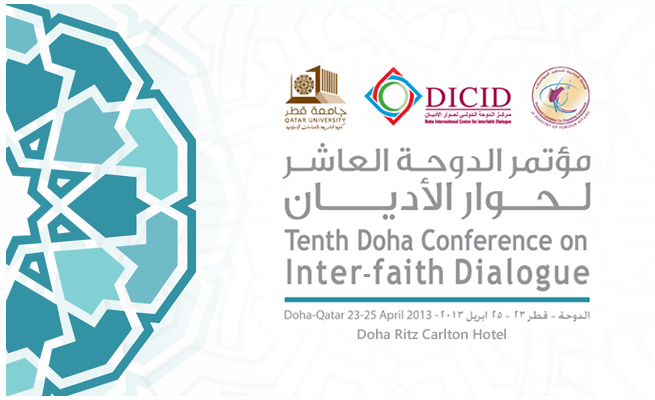topics
10 th Doha Conference for Interfaith Dialogue
From 23-25 April 2013 Doha- Qatar
At the 10th Doha Conference on Interfaith Dialogue, we will celebrate the tenth anniversary of establishing the annual conference on interfaith dialogue in Qatar by presenting to the world the work of interfaith at its best. Therefore, we are inviting organizations, institutions, universities and NGOs working in the field of interfaith dialogue to present their successful projects in this domain, and to display their best achievements during the event. The Doha International Award on Interfaith dialogue will be granted for the first time to a person or institution which will present the best practice in the field of interfaith dialogue.
The title of the 10th Doha Conference is:
"Best Practices in Interfaith Dialogue"
DICID identified, after a thorough study on the major works in the field of Interfaith Dialogue, four main topics for the forthcoming conference based on the current activities worldwide.
1. Academic:
| a. | Research and Teaching: Academic excellence in the teaching and study of interfaith relations and in the dissemination of academic research. |
| b. | Content Development: School and university curriculum development that encourages interfaith understanding. Course and textbook development that caters for education on different faiths. |
| c. | Teacher training: in order to make teachers prepare their students for an understanding of different religious traditions and values. |
2. Justice:
| a. | Economic: Mobilize communities under an interfaith umbrella for sustainable development and poverty alleviation. |
| b. | Social and Environmental: Educating about social and environmental justice and advocating for change through interfaith efforts. Raising awareness about environmental crisis and concerns amongst communities of different faiths. |
| c. | Health and Charity: Encouraging fundraising and networking amongst philanthropists with a religious commitment. Promoting the well-being of the underserved by providing access to high quality healthcare services for people of different faiths. Raising awareness and prevention techniques about pandemics and mental health problems for people of different faiths. |
3. Conflict Resolution and Peace:
| a. | Pre-Conflict: Prevent violent conflicts, including wars and address the root causes of violent religious conflict before it begins. |
| b. | During Conflict: Develop strategies that promote reconciliation and peace building between religious communities during conflict. |
| c. | Post-Conflict: Support and develop better understanding between communities that have been in conflict. Supporting religious institutions to heal the psychological traumas caused during violent conflicts. |
4. Media Culture:
| a. | Stories: Telling stories of interfaith engagement through images (photography and documentary). |
| b. | Technological and Program Development: Using social media and mobile technologies to improve interfaith communication. Developing TV and Radio Programs for improving interfaith understanding. |
| c. | Creativity: Exploring and developing new understandings of interfaith relationships through the media of art, music and literature. |
documents
latest news
10 th Doha Conference for Interfaith Dialogue
From 23-25 April 2013 Doha- Qatar





